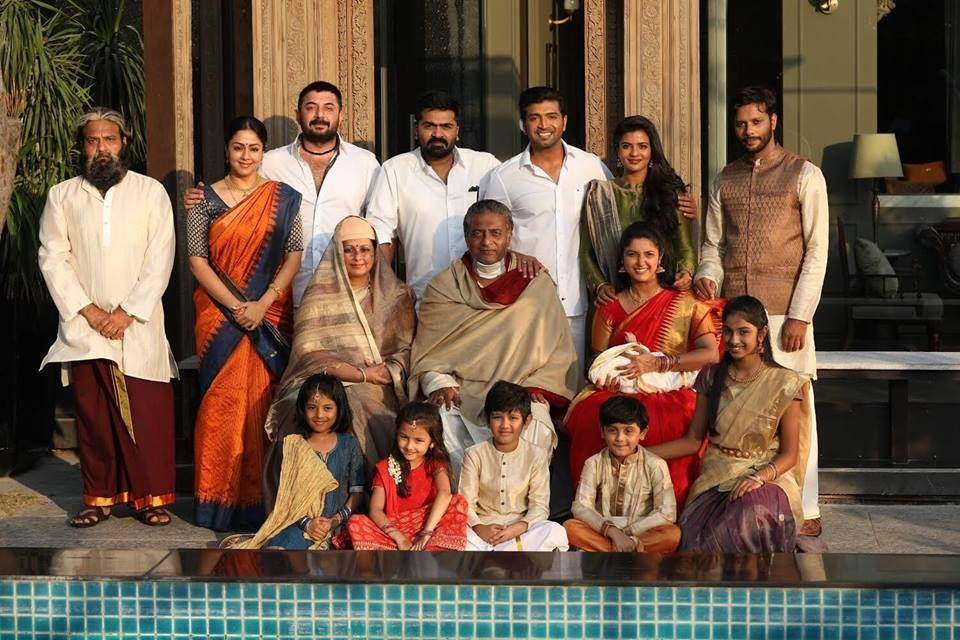Chekka Chivantha Vaanam starts out featuring all the Mani Ratnam tropes. It pays ritual homage to Godfather through a Corleone-like family. There is the don who is shot but survives, and he has three sons and a daughter. The first son is a hot-head and not terribly bright whereas the third is far removed from the family business — Sonny and Michael Corleone. There is even a naming ceremony for the daughter’s child although it is not marred by murders but marked by a truce between ageing patriarchs.
For several years now, Mani Ratnam has appeared like a jaded fossil trapped in an outdated formula of his own making.
The tropes give the assurance that we are indeed watching a Mani Ratnam film. Such tropes seemed novel once upon a time, not anymore. For several years now, Mani Ratnam has appeared like a jaded fossil trapped in an outdated formula of his own making. In CCV, however, his dalliance with fauve Leftism, the heroic other, and the gangster who may have his reasons has ended. There is no mood lighting looming over the frames, no mushy romance, no brilliant music lighting up the screen but only haunting mumbles in the background, and no suggestion that the dark side may actually be bright.
In CCV, Mani Ratnam has made short work of what seemed like his pet themes. From Pagal Nilavu to Raavan through Kaatru Veliyadai, the hero had morphed into villain and the villain was often heroic. In Raavan, Mani Ratnam dared to suggest that his Sita may have developed a soft corner for her captor when she discovered that her Ram was not really moored in high ethics.
In CCV, the shades have thinned out. Positions have sharpened. There is the good and there is the bad. There is ‘we’ and there is them. There is a cop and there is a robber. Moral choices are straightforward and Mani Ratnam makes the choices. The gangster is bad, through and through. The don, unlike Velu Nayakan or Vito Corleone, is not a straightlaced monogamist. Family loyalty has no significance for any of the sons. Each one is out to get the other from the very beginning.
Imagine Sonny Corleone joining hands with Turk Solozzo since he felt the family should join the drug business. Sacrilege, it would have been.
Fredo’s betrayal was the tragic theme of Godfather that wrenched Michael and turned his heart into stone. In CCV, such betrayals are routine and have only comic value. A morally decrepit family that does not believe in kinship should find no place in Mani Ratnam. But it is the centerpiece in CCV.
Mani Ratnam has destroyed his props in CCV. He has obliterated his shibboleths, buried his demons. He has joined the crowd of younger, talented filmmakers of Tamil cinema who make edgy films filled with surprises and plot twists. He has made a racy thriller full of unexpected detours.
Mani Ratnam was the nerdy filmmaker who dominated box office space just as Narayan Murthy became the nerdy south Indian millionaire.
CCV starts neo-classical, but, soon enough, becomes contemporary. It marks a moment in the lives of a generation of Indians, such as me, for whom Mani Ratnam films continue to be larger-than-screen. We the Mani Ratnam generation grew up in the eighties when every political party including the BJP was socialist. We were taught to be Leftwing at heart but we had enough experience of the outside world that we took charge of the nation and took it to where it is today. We made business, money making and living well central to the Indian experience but at the same time professionalized business. Some of our fathers may have been Lalas running family businesses but we turned around the businesses we inherited. Mani Ratnam came from a film family but he laid no claim to a legacy. Instead he seemed more like a middle-class gatecrasher with ideas.
We brought in technology and created a niche for the nation. We were self-assuredly selfish and made selfishness appear virtuous.
Mani Ratnam was the emblem of cool south India. Understated, low-key but highly qualified and professional, Mani Ratnam was the nerdy filmmaker who dominated box office space just as Narayan Murthy was the nerdy south Indian millionaire.
With CCV, Mani Ratnam has jettisoned his moral ambiguity and self-doubt. In the era of Narendra Modi, Mani Ratnam stands for the correct, national goal. Rasool’s father may have been a gangster but he sees people like his father as morally reprobate. For Velu Nayakar, Hussain bhai was a role model. For Rasool, the police did the right thing by shooting down his gangster father. In the world of CCV, the Dil Se suicide bomber would be a horrible terrorist, not a wronged woman ignoring true love and seeking revenge.
